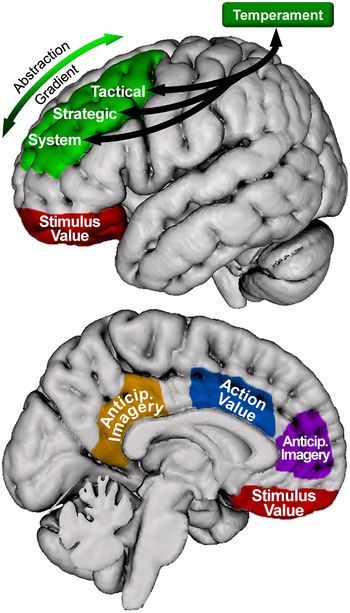The Cingulate gyrus lies on the medial aspect of the cerebral hemisphere. It forms a major part of the limbic system which has functions in emotion and behaviour. The cingulate gyrus is an arch-shaped convolution situated just above the corpus callosum. The frontal portion is termed the anterior cingulate gyrus (or cortex).
 |
| Cingulate Gyrus |
- A component of the limbic system, it is involved in processing emotions and behavior regulation. It also helps to regulate autonomic motor function.
- Furthermore, the cingulate cortex has many bilateral connections with the frontal, temporal, and occipital cortex of both hemispheres of the brain.
Functions
- Coordinates Sensory Input With Emotions
- Emotional Responses to Pain
- Regulates Aggressive Behavior
- Communication
- Maternal Bonding
- Language Expression
- Decision Making
Divisions
 |
| Cingulate Gyrus (Neuroanatomy) |
Anterior cingulate cortex (ACC) is the frontal part of the cingulate cortex. The ACC forms a collar around the corpus callosum, which relays neural signals between the right and left hemispheres. The ACC appears to play a role in a wide variety of autonomic functions, such as regulating heart rate and blood pressure, and is vital to cognitive functions, such as reward anticipation, decision-making, empathy, and emotion. Neuroscientists indicate the dorsal anterior cingulate cortex is primarily related to rational cognition while the ventral is more related to emotional cognition.
- According to the latest research by Alcino Silva and colleagues at the University of California, Los Angeles, the anterior cingulate cortex is responsible for rendering new memories permanent.
- Appears to be crucial in the pre-determined mode network of the brain. In other words, a system in the brain that stays active even when you aren’t paying attention to external stimuli.
- Difficult dilemmas tend to elicit increased activity in the anterior cingulate cortex, a brain region associated with "response conflict."
- Most studies concern the anterior cingulate cortex. Eg studies show that the activity of the anterior cingulate cortex increases while subjects solve tasks involving cognitive control (such as error detection, conflict monitoring, and/or dual tasks for attention and tests for the executive component of working memory)
The Posterior Cingulate Cortex (PCC) is the backmost part of the cingulate cortex, lying behind the anterior cingulate cortex. This is the upper part of the "limbic lobe".
- Far less is known about the posterior cingulate cortex (according to the PubMed data base, there are almost six times fewer references to it in published works than there are to the anterior cingulate cortex). It is known that the posterior cingulate cortex activates in healthy humans when they are retrieving memories from autobiographical episodic memory.
Disorders
The cingulate gyrus is the subject of many cognitive and neurocognitive studies. It has been implicated in eg. Alzheimer’s disease, anxiety disorders, addiction, depression, bipolar disorder and schizophrenia.
- Schizophrenic patients have differences in the anterior cingulate gyrus when compared with controls. Anterior cingulate gyrus was found to be smaller in schizophrenic patients. The volume of the gray matter in the anterior cingulate gyrus was found to be lower in schizophrenic patients
- Early atrophy of the cingulate cortex is a feature of both behavioral variant frontotemporal dementia (bvFTD) and Alzheimer’s disease (AD), with degeneration of the anterior cingulate region increasingly recognized as a strong predictor of bvFTD
- The ACC serves as a central "hub" in addiction-related neural networks of cognitive functions, including decision-making, cognitive inhibition, emotion, and motivation. Substance use disorder (SUD) is characterized by compulsive use of addictive substances with considerable impact on both the medical system and society as a whole. New insights on the anterior cingulate cortex (ACC) suggest neuromodulation targeting the ACC as a way to treat SUDs.
In conclusion, damage to the cingulate gyrus can affect your ability to respond to certain stimuli. That could lead to eg.aggressive behavior, shyness, or a decrease in emotional expression.


0 Comments